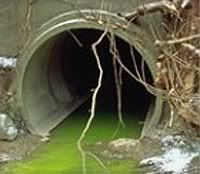Restraining Those Who Wish To Profit at the Expense of the Rights of Others
A reader sent me this very clever article that was published in 1969 by Garret Hardin called “The Tragedy of the Commons” with a note that read, “Here’s something that I think might resonate with you.”
I respond:
Wow, that was terrific; I very much agree with the analysis. Thanks very much.
I don’t think there’s much debate that people abuse “the commons” — and for the precise reasons presented so well in the article. The problem is what to do about that.
E.g., how do we go about internalizing the externalities of fossil fuels? If I dump my garbage onto a commons like a town park, there are obvious and swift legal remedies that the town can take against me. But the huge polluters don’t face the same consequences when their violations are a many orders of magnitude larger, i.e., dumping megatons of garbage into our oceans and skies. We’re a million miles from putting a tax on carbon, or establishing some other form of coercion to restrain those who wish to profit at the expense of long-term environmental damage, the increase in respiratory illnesses, etc.
Why? In a word, corruption.
These entities are powerful enough that they fight effectively against society’s attempts to regulate them. And at this point, it seems that they are winning the battle; here in the US, we could be looking at peeling back decades of environmental regulation, and putting the brakes on the development of cleantech – at least within the public sector.
Again, thanks for thinking of me.


Have you ever heard the term “clear and present danger”?
A garbage can filled with malodorous detrius will unify the users of the commons when it invades their life space.
A colorless, odorless, tasteless, nontoxic gas in low concentrations will not bnring abount any unanimity of thought regarding limitations on the liberty of the perpetrators.
When the danger rises to a undisputable level that affects the wellbeing of everyone, we will become united and save the planet.
Now maybe we are dealing with a human caused, slowly creeping environmental degradation but until natural causes of our climate change are ruled out conclusively…. nobody is going to get fascism installed to take care of a perceived problem. We haven’t quite reached a tipping point but if and when we do, we will have consensus. That’s my take on where we are right now in this tense battle between the left and the right political protaqonists. LL
That’s got to be one of the most interesting articles I’ve read for a very long time, even in 1969 in a strong way validates the views many of us here hold dear on waste and pollution (to take a topical aspect of a very comprehensive work)and energy. Much of what is written has proven the case in the succeeding 40+ years. In my own country (UK)our government is being pilloried for setting legally binding percentages for renewable energy and making it more expensive to carelessly dispose of waste than to treat it first, because of the economic situation. They have my support because I believe there is no alternative if we are not to screw up our environment completely. My work in developing countries dramatically illustrates the tragedy of unrestrained dumping of toxic and other wastes, on the human and animal population. We take risks trying to change this behaviour but a few are priviledged to truly make a difference and should grasp the opportunity when we have it. I’ll leave the arguments on population control to others, but have sympathy with the views expressed.
Larry,
One of the problems is that if people wait until global warming becomes inescapably obvious enough to cause unified action, it will be too late to prevent extensive damage. Even then, many people will probably continue to deny that human behavior caused the problem. Unfortunately, sufficient action may be delayed until it is too late and the next generations may just have to live with the resulting problems for centuries. Probably both of us are in agreement on that.